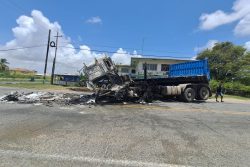It was inevitable that the absence of a confirmed Chancellor of the Judiciary and a Chief Justice and the implications of such would arise at international fora. After all, Guyana has not had a confirmed Chancellor for 17 years and the current Chief Justice has been acting in the position since 2017 as have others before her.
When Guyana faced questions for its third and final day before the UN Human Rights Committee (CCPR) on Wednesday, Minister of Parliamentary Affairs and Governance Gail Teixeira, was pressed to provide answers on the independence of the judiciary and specifically the reason this country continues to be without a substantive Chancellor and Chief Justice.
As has been pointed out by many others, Portuguese committee member José Manuel Santos Pais said that this situation negatively affects the employment and other benefits of those judges as well as hampers their security of tenure.
While he didn’t say it, the absence of confirmation has been held like the Sword of Damocles over the holders of the top positions and has had the effect of weakening confidence in the judiciary and its independence of action. Both the PPP/C and APNU+AFC governments are to be blamed for this undermining of the judiciary – a vital branch of government.
Try as she might, the Minister of Parliamentary Affairs was unable to explain why this situation prevails and she withheld a material fact from the committee.
She told the committee that the impasse continues to be a lack of agreement between the President and Leader of the Opposition.
That is indeed the case, however, nearly two years ago, Opposition Leader Aubrey Norton said he was prepared to agree to the immediate appointing of Justices Yonette Cummings-Edwards and Roxane George-Wiltshire as Chancellor and Chief Justice respectively. Shockingly, President Ali has never responded to that proposal neither did he make one of his own. The President has been delinquent in this very important matter. His dereliction exudes disregard for the Constitution of Guyana.
Facing a second round of questions from Mr Pais, Ms Teixeira provided a historical background, referencing the 1999/2001 constitutional reform process and stated that “politically, the two major political parties, following a lot of violence, efforts had been made to return to normalcy and to ensure the involvement of the opposition party in that process”.
Pointing to examples in the Region, she said that what was built into the Constitution was for those appointments to be made by the President after agreement with the Opposition Leader who she noted has a veto on the appointments.
Ms Teixeira then said that this formula will have to be reviewed. Whether it makes sense she said, will be a decision for the Guyanese people.
She described the enactment of the amendments from 1999/2001 as being well-intentioned “to build harmony and a greater working relationship between the President and Opposition Leader”.
Ms Teixeira said that notwithstanding the issues surrounding the amendment achieving its intended purpose, “we want to make it very clear that formula has not resulted in control, direction or lack of independence of the judiciary.”
President Ali’s refusal to act on this matter is akin to judge-shopping. He is not interested in confirming either of the two holders of the posts but is still not taking the initiative to respond with a proposal of his own. He is clearly biding his time.
When challenged at a press conference on September 9th last year, the President presented a series of vacuous excuses.
“There is a way things are done; the right way and the wrong way. And I have said what is the right and wrong way. I said the JSC (Judicial Service Commission) was in place… that commission will now conduct its work independently, not only of the issue of the Chancellor and Chief Justice but I know they are working on the judiciary in its macro form. Because there is a lot of vacancies and appointments that needs to be made. Having said that, I have said, the country is not without a Chancellor and Chief Justice. We have a Chief Justice and a Chancellor who have the power to execute their duties to the fullness of the constitution”, he said.
When told by a reporter that the appointments of the Chancellor and Chief Justice were not tied to the completion or any works of the JSC, the President repeated that the country was not without persons acting in the two posts.
“I said the Judicial Service Commission because my view of this is that we have to look at the entire judiciary. We are not without a chancellor and chief justice. I want the work of the JSC to be expanded so that we can understand the fullness of the issues and challenges of the judiciary so that we can address this in a holistic way.”
Not only is the President defying the import of the constitutional provisions but he has ignored a ruling of Justice Damone Younge in April of 2023 that “all convenient speed” be employed in making the substantive appointments.
The judge said that the current state of affairs “is a stain to our country’s otherwise richly woven legal tapestry.”
She made it clear, however, that contrary to the action brought by the main opposition APNU+AFC, the President could not be said to have been in dereliction of duty nor constitutional breach with any delay ascribed to him by the political party between August 2020 and April 2022, for not ensuring the appointments of the top two judicial posts.
Nearly a year has elapsed since the Judge’s ruling and President Ali is still to act. While the media has kept the focus on this matter, other parts of civil society have shrunk from their responsibilities. The Bar Association has spoken occasionally on the matter but not with any conviction.
It is high time that the President ends the stalemate by responding to Mr Norton’s proposal.









